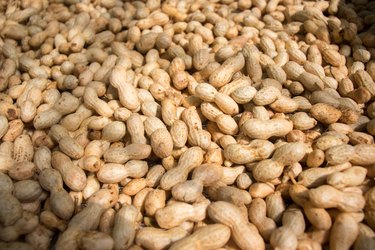
Gout is a complex type of arthritis. Consuming foods with high concentrations of purine compounds can exacerbate its symptoms. Health professionals recommend that gout sufferers follow a diet emphasizing plant-based foods that contain either low or moderate amounts of purines. Nuts -- particularly peanuts -- are one of the best low-to-moderate purine sources of protein for people with gout.
Gout
Video of the Day
Gout occurs when crystals of excess uric acid build up in the joints, especially joints in the toes, fingers, knees, elbows and feet. The uric acid crystals cause inflammation and swelling in the tissue within the joint, resulting in episodes of extreme pain, fever and the formation of lumps directly beneath the surface of the skin. Medical conditions like cancer, metabolic syndrome and blood disorders can cause gout, as can a genetic predisposition, surgery or a diet high in triglyceride fats, alcohol and purine-rich foods. You can often control gout symptoms with anti-inflammatory drugs, but health professionals strongly recommend adopting a diet that is rich in antioxidants, fiber, magnesium and low in purine compounds.
Video of the Day
Peanuts in the Gout Diet
According to the Dial-A-Dietitian Nutrition Information Society of British Columbia, peanuts and peanut butter eaten regularly in small amounts are a good source of protein for people with gout since they contain low-to-moderate amounts of purines. Purines are nucleotide- base compounds like guanine, adenine and xanthine that are basic components of the DNA, RNA and ATP in both plants and animals. In the body, purines are broken down to yield the uric acid that contributes to the excess uric acid crystal formation responsible for gout symptoms. Peanuts contain enough purines to equal 79 mg of uric acid per every 100 grams, an amount that is considered a low-to-moderate purine concentration. Nuts like peanuts may also benefit gout sufferers since they contain fatty acids that have anti-inflammatory properties, notes nutritionist, Beth M.Ley, PH.D.
Other Recommended Foods
Other recommended foods that contain purine levels comparable to peanuts include skinless poultry, fish, dried beans and legumes, oatmeal and vegetables like spinach, cauliflower, mushrooms, asparagus and peas. It is best to consume these foods in moderate amounts -- no more than 1/2 cup of the vegetables and 4 to 6 oz. of lean meat daily. Even lower purine levels -- between 0 to 50 mg purines for every 100 grams -- are found in foods like fruit, whole grains, eggs, low-fat dairy products and most vegetables. In addition to low-purine foods like peanuts, the University of Maryland Medical Center advises people with gout to consume antioxidant-rich foods like cherries or cherry juice and whole grains like brown rice, bran, oats and barley. If you have gout, you should also cook with fats like olive or vegetable oil and to drink at least six glasses of water daily.
Foods to Avoid
People with gout should strictly limit their intakes of foods with purine levels over 150 mg of uric acid-forming purines for every 100 g. (See Reference 2) These foods include organ meats like liver or kidney, goose, shellfish like mussels or scallops, game meat, and fish like sardines, smelt, herring, mackerel and anchovies. Gout sufferers should avoid alcohol, tobacco, carbonated beverages sweetened with sugar, products like pasta and white bread that contain refined flour and pre-made baked goods like cakes, crackers, cookies and doughnuts, which usually have large amounts of trans fats.
- University of Maryland Medical Center; Gout; Steven D. Ehrlich, NMD; March 10, 2010
- Dial-A-Dietician Nutrition Information Society of B.C.: Diet for Gout
- Dietaryfiberfood.com: What are Purines?
- Acumedico.com: Various Food Types and Their Purine Content
- MayoClinic.com; Gout; Nov. 14, 2009
- MayoClinic.com: Gout Diet; March 10, 2010
Is this an emergency? If you are experiencing serious medical symptoms, please see the National Library of Medicine’s list of signs you need emergency medical attention or call 911.